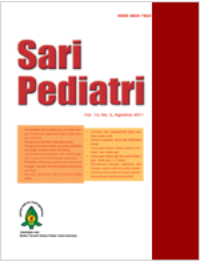Pemantauan pH Esofagus pada Bayi Tidak Mempengaruhi Aktivitas dan Pola Makan, Namun Mengkhawatirkan Persepsi Orangtua
Sari
Latar belakang. Pemantauan pH esofagus (pH-metri) merupakan pemeriksaan baku
untuk mendiagnosis refluks gastroesofagus (RGE) pada bayi. Hasil pH-metri dipengaruhi
oleh pola makan dan aktivitas bayi, sedangkan pengaruh prosedur pH-metri itu sendiri
terhadap pola makan dan aktivitas bayi belum banyak dilaporkan.
Tujuan. Tujuan penelitian ini untuk mengetahui apakah prosedur pH-metri
mempengaruhi pola makan dan aktivitas sehari-hari serta bagaimana persepsi orangtua
terhadap prosedur pH-metri.
Metoda. Tiga puluh bayi berumur 6-12 bulan dilakukan pH-metri. Orangtua diberi
kuesioner berisi pertanyaan yang berhubungan dengan pola makan dan aktivitas anak
selama pemantauan berlangsung serta persepsi orangtua terhadap prosedur pH-metri.
Untuk analisis statistik, setiap variabel dikelompokkan menjadi ’tidak berubah’ dan
’berubah’ untuk pola makan dan aktivitas anak, serta ’positif’ dan ’negatif’ untuk persepsi
orangtua. Setiap variabel dianalisis berdasarkan hasil pH-metri (’normal’ atau abnormal’).
Hasil. Perubahan pola makan terdapat pada 17% bayi sedangkan perubahan aktivitas
pada 20% bayi. Kedua hasil tersebut tidak berbeda baik pada hasil pH-metri normal
maupun hasil pH-metri abnormal. Dua puluh tujuh persen orangtua mempunyai persepsi
positif terhadap prosedur pH-metri.
Kesimpulan. Prosedur pH-metri tidak menyebabkan perubahan pola makan dan
aktivitas bayi, walaupun demikian hanya sekitar 27% orangtua yang menganggap
prosedur pH-metri sebagai prosedur yang tidak mengkhawatirkan.
Kata Kunci
Teks Lengkap:
PDFReferensi
Hegar B, Vandenplas Y. Gastroesophageal reflux in infancy.
J Gastroenterol Hepatol 1999; 14:13-9.
Branicki FJ, Evans DF, Ogilvie AL, Atkinson M,
Hardcastle JD. Ambulatory monitoring of oesophageal
pH in reflux oesophagitis using a portable radiotelemetry
system. Gut 1982; 23:992-8.
Vandenplas Y, DeWolf D, Deneyer M, Sacre L. Incidence
of gastro-esophageal reflux in sleep, awake, fasted and
postcibal periods in asymptomatic and symptomatic infants.
J Pediatr Gastroenterol Nutr 1988; 7:177-81.
Mearin FJ, Balboa A, Dot J, Maldonado O, Malagelada
JR. How standard is a standard day during a standard
ambulatory 24-hour esophageal pH monitoring ?. Scand
J Gastroenterology 1998; 33:583-5.
Vandenplas Y, Belli D, Boige N, Bouquet J, Cadranel S,
Cezard JP, et al. A Standardized protocol for the methodology
of esophageal pH monitoring and interpretation
of the data for the diagnosis of gastroesophageal
reflux. (ESPGHAN-society statement). J Pediatr
Gastroenterol Nutr 1992; 14:467-71.
Vandenplas Y, Goyvaerts H, Helven R. Gastro-esophageal
reflux, as measured by 24-hour pH monitoring,
in 509 healthy infants screened for SIDS-risk. Pediatrics
; 88:834-40.
Arana A, Hauser B, Hegar B, Kaufman L, Vandenplas Y.
Oesophageal pH monitoring in children: How is it perceived
by the parents and does the technique change feeding
and daily activity ?. Acta Paediatr 2003; 92:1021-25
Coletti RB, Christie DL, Orenstein SR. Statement of
the North American Society for Pediatric Gastroenterology
and Nutrition (NASPGAN). Indications for pediatric
esophageal pH monitoring. J Pediatr
Gastroenterol Nutr 1995; 21:253-62.
Nebel OT, Castell DO. Lower oesophageal sphincter
pressure changes after food ingestion. Gastroenterology
; 63:778-83.
Becker DJ, Sinclair J, Castell DO, Wu WC. A comparison
of high and low fat meals on postprandial oesophageal
acid exposure. Am J Gastroenterology 1989;
:782-6.
Vandenplas Y, Sacre L, Loeb H. Effects of formula feeding
on gastric acidity time and oesophageal pH monitoring
data. Eur J Pediatr 1988; 148:152-4.
Hegar B, Vandemaele K, Arana Alvaro, Vandenplas Y.
Oesophageal pH monitoring in infants: Elimination of
gastric buffering does not modify reflux index. J
Gastroenterol Hepatol 2000; 15:902-5
Fass R, Hell R, Sampliner RE, Pulliam G, Graver E,
Hartz V, et al. Effect of ambulatory 24-hour esophageal
pH monitoring on reflux-provoking activities. Dig Dis
Sci 1999; 44:2263-9.
Clark S, Kraus BB, Sinclair J, Castell DO. Gastroesophageal
reflux induced by exercise in healthy volunteers.
JAMA Med Assoc 1989; 261:3599-601.
Soffer EE, Merchant RK, Duethman G, Launspach J,
Gisolfi C, Adrian T. Effect of graded exercise on esophageal
motility and gastroesophageal reflukx in trained
athletes. Dig Dis Sci 1993; 38:220-4.
DOI: http://dx.doi.org/10.14238/sp8.4.2007.305-9
Refbacks
- Saat ini tidak ada refbacks.
##submission.copyrightStatement##
##submission.license.cc.by-nc-sa4.footer##
Email: editorial [at] saripediatri.org


Sari Pediatri diterbitkan oleh Badan Penerbit Ikatan Dokter Anak Indonesia
Ciptaan disebarluaskan di bawah Lisensi Creative Commons Atribusi-NonKomersial-BerbagiSerupa 4.0 Internasional.




